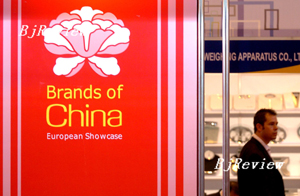
People's Daily: Are international inflationary pressures increasing? Is it true that the cause of the inflation is an increase in the prices of Chinese exports?
Zhang Anyuan: Inflation has become a big concern since the beginning of this year, forcing governments throughout the world to put curbing inflation atop their economic agendas. The U.S. core consumer price index (CPI) was 206.7 in August, compared with 202.6 in January. The rate of inflation in Europe has exceeded the 2 percent mark set by the European Central Bank. Some predict it is impossible for the figure to fall back below 2 percent. Japan's CPI began to rise in April after a period of decline, which meant the end of deflation. In July, Japan ended its longstanding zero-interest policy.
The price of crude oil has fallen recently, but its impacts on the CPI are still unclear.
Some overseas research institutes are suggesting that the cause of inflation is an increase in the prices of China-made commodities, but I don't think they have reason to draw that conclusion. Customs statistics show that not all commodities exported from China have seen price hikes, while some have even become cheaper. Moreover, an increase in foreign consumer costs in the second half of this year should take into account fluctuations in the prices of China's export commodities in the first half of this year.
Is there any evidence to show that China is not responsible for inflation in other countries?
China's economy is not strong enough to reverse either international inflation or deflation. In addition, inflation in China has not risen recently.
As we all know, the free-on-board prices of many China-made everyday-use commodities contribute only a small part to the retail prices in overseas markets. Middlemen are behind rising prices.
Finally, processing trade makes up half of China's exports. This trade is manipulated by transnational companies. China is just an upstream workshop, which does not set the end-user prices. China does influence prices of some primary products like energy in the international market, but inflation indexes are not directly related to energy prices in all countries around the world.
Where has the idea that China is to blame for international inflation come from?
The "China threat" theory continues to haunt some countries. A few years ago, some people argued that international deflation was caused by cheap exports from China. Later, the rising prices of primary products made many opportunities available to developing countries, which China supported. However, people critical of China turned a blind eye to this. On the contrary, they said China was scrambling for international resources. Now, they are blaming international inflation on regular price fluctuations in China's export prices.
I think the conclusion that the rise in the prices of Chinese exports drives up international inflation may come from the following two factors. One is the Chinese economy's high dependence on foreign trade. The country currently accounts for 8 percent of global trade and has an even larger share in terms of the export volume. As a result, China has a say in fixing prices of some commodities in the international market. On the other hand, a large number of Chinese exports are included in the CPI baskets in destination countries. Foreign consumers are therefore sensitive to price fluctuations of China-made commodities.
What is the main cause of international inflation? What kind of role does China play?
The formation and spread of international inflation is the result of economic growth in every country and the spread of globalization. Although the worldwide economic boom has continued for several years, the growth cycle will eventually play its role in the market economy. So inflation and ensuing anti-inflation measures are unavoidable. Furthermore, high oil prices push up the prices of other goods as well.
China is becoming a major driving force of global economic growth. It is cautious about its role and hopes to make a greater contribution to the world economy. However, the power of one country alone is not enough to reverse a trend in the international economy. All countries should recognize this and cooperate with each other. Complaining and shifting blame make no sense.
How should we forecast the relationship between China and international prices in the next phase?
An increase in the rate of inflation will not occur in China in the near term, but international inflation will maintain a slow uptrend. With the constant rise of China's proportion in the global economic aggregate and the import and export trade, its domestic prices will play a bigger role in international market prices.
| 